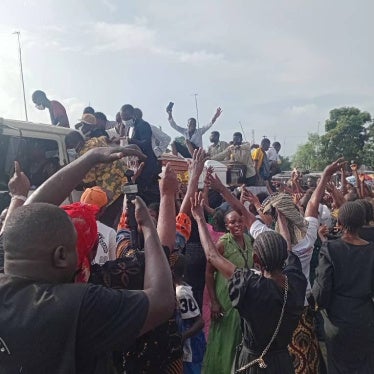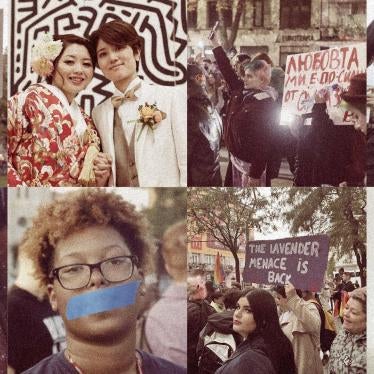(New York) - Sudanese national security officials subjected large numbers of youth protesters to severe physical and sexual abuse following protests in January and February, 2011, Human Rights Watch said today. Based on testimony and information collected by Human Rights Watch, the students and youth, some as young as 18, were subjected to harsh beatings, electric shocks, and other abuses that amount to torture. Security officials are also implicated in the rape of a female youth activist in February.
Sudan should publicly condemn the use of torture, including sexual violence and other abuses committed by national security officials after the protests, Human Rights Watch said. These crimes should be promptly investigated and those responsible brought to justice. The government should also immediately release or bring to trial those still in detention and ensure the rights of detainees are fully respected.
"These heinous allegations clearly show that Sudan's abusive national security apparatus is using torture and harassment to silence dissent," said Daniel Bekele, Africa director at Human Rights Watch. "The Sudanese authorities need to take immediate measures to stop torture, ill treatment, and harassment by the national security officials."
Ill-treatment and Torture
Following the largely peaceful demonstrations in February, inspired by popular uprisings in Egypt and Tunisia, riot police and national security forces used excessive force to suppress public protests and dissent, Human Rights Watch found. Authorities arrested more than 100 people on January 29, 30, and 31 in Khartoum and Omdurman alone.
Although police and security authorities released many detainees within hours, security officials detained several dozen people in the Bahri office compound in North Khartoum for weeks, some in a makeshift detention cage and others in a large room, and subjected them to beatings, sleep deprivation, electric shocks, and other forms of physical and mental abuse including death threats and threats of rape, some of the detainees told Human Rights Watch.
Yousif Elmahdi, a 27-year-old son of an Umma opposition party leader, was blindfolded and made to crouch facing a wall and severely beaten with metal rods, batons, and whips. He heard the "agony and screams" of other detainees in the same compound and saw their injuries later, he told Human Rights Watch.
"These boys, some as young as 18, were so very clearly beaten to a pulp. They had blood on their shirts and were heavily limping and crawling," he recalled.
Another student, who asked not to be named, was arrested in a public square in Khartoum on the morning of February 3 and held in Bahri for two weeks.
"Many people were seriously beaten and tortured, crying the whole night," he said. "Sometimes they got electric shocks, or were beaten with sticks and bars. I saw two were so badly beaten they had to be treated in the hospital."
Over the following weeks, security officials arrested other student activists suspected of involvement in organizing the protests or publicizing the abuses of detainees by national security officials.
Ali Mohammed Osman, a student member of the Sudan People's Liberation Movement who was carrying fliers calling for the release of protesters, was arrested by a group of security agents in Omdurman on the night of February 14 and interrogated for more than 24 hours.
He told Human Rights Watch that he was blindfolded, forced into a truck, and taken to a detention center, where he was threatened, interrogated, and beaten on his back and shoulders with sticks and a plastic pipe and forced to remain standing all night. The beatings caused severe injuries, requiring him to seek medical care upon his release.
National security officials forced detainees to sign statements pledging not to participate in more protests or talk about conditions of detention before releasing them, those interviewed told Human Rights Watch. Several detainees went into hiding after their release, fearing retaliation. Security officers attempted to re-arrest Osman on two occasions after he publicly reported his mistreatment. Another youth activist, currently in detention, was re-arrested after he posted information on Facebook about mistreatment he saw in detention, according to released detainees.
At least 13 protesters, including four journalists, are still in detention at Bahri and are at risk of similar ill-treatment, Human Rights Watch said. The released detainees told Human Rights Watch that many who are still in detention had already been subjected to torture and mistreatment, including electric shocks, sleep deprivation, and being forced to strip down to their underwear.
Sexual Violence
Security officials are also implicated in sexual violence and harassment of female activists, including the brutal rape of Safia Ishaq, a young activist and artist. Ishaq publicly reported on social media that on the morning of February 13 two security agents forced her into their vehicle and took her to a building in Khartoum, where they interrogated her about her political affiliation, beat her until she fell unconscious, and then raped her.
Her ordeal, which has attracted considerable domestic and international attention, prompted Sudanese civil society groups to report other cases of verbal and physical sexual harassment of women activists by national security officials. Marwa al-Tijani, arrested on February 3, reported that security officers beat her and a group of other female activists in detention, calling them "whores" and other insults.
Female members of the Popular Congress Party told journalists that national security officers had physically harassed them when they were gathered peacefully on February 16 to protest the detention of fellow party members. In January, security officials arrested the opposition figure Hassan al-Turabi and 20 other party members after al-Turabi publicly warned the Sudanese government that there would be an uprising if it continued to refuse to make reforms.
"The Sudanese authorities should not tolerate rapes, assaults, or any other form of harassment," Bekele said. "Authorities should take these reports seriously, investigate them promptly, and hold officials accountable."
Sudan's National Intelligence and Security Service (NISS), with its broad powers of arrest and detention, has a reputation for targeting political activists and subjecting them to ill-treatment and torture while in detention. National security officials also carry out enforced disappearances, detaining people in secret detention centers and not allowing any family, lawyer, or doctor visits.
Although the 2005 Comprehensive Peace Agreement, which brought an end to Sudan's long civil war, required the Sudanese government to reform the national intelligence and security service, the National Security Act of 2010 retained the security service's broad powers of arrest and detention for up to four and a half months without judicial review, in violation of international standards.
Human Rights Watch urged the government to reform the security service in line with international standards. The government should ensure that every detention is properly registered and that anyone detained is treated in accordance with the law, including having access to legal counsel and medical care.
"Sudan can only achieve and maintain stability by respecting human rights and the rule of law," Bekele said. "It should rein in its abusive security forces and let people voice their opinions freely."









